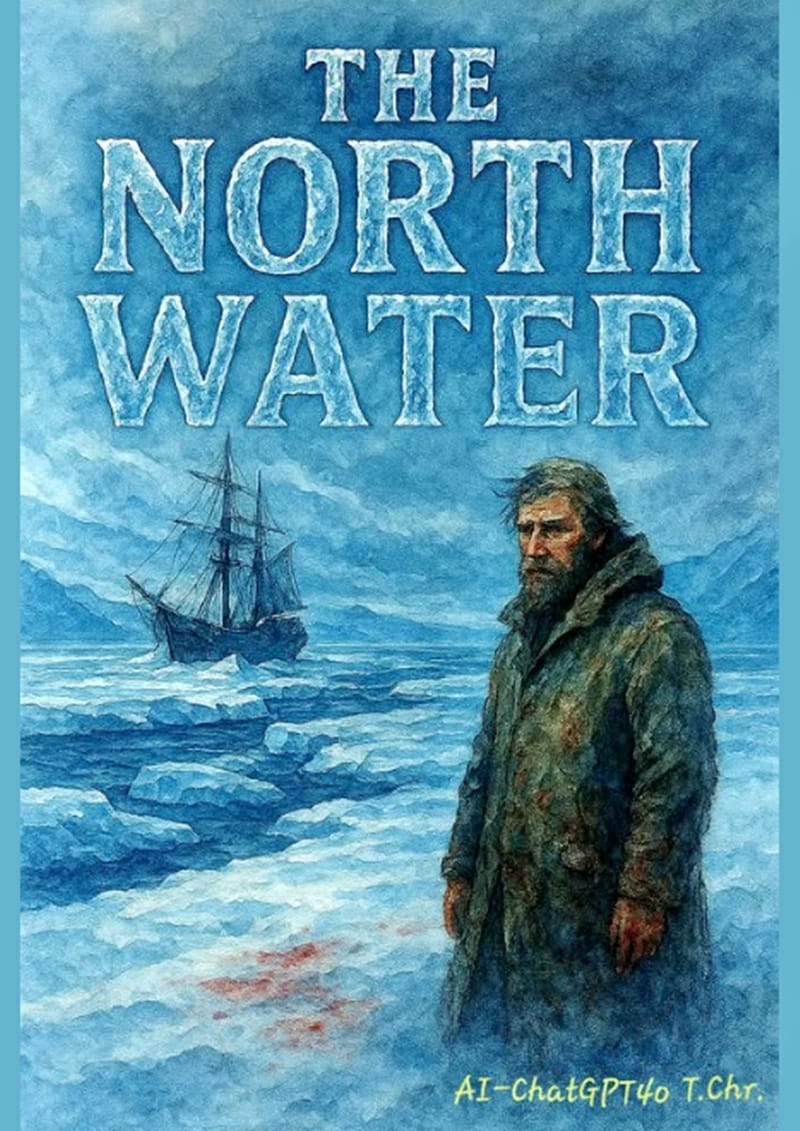THE NORTH WATER

By AI-ChatGPT4o-T.Chr.-Human Synthesis-25 June 2025
When ice isn't the coldest thing…The stink of the docks curled into the morning fog as Patrick Sumner pulled his coat tighter and stepped aboard the Volunteer. The ship groaned beneath him like some old beast waking from sleep, her rigging creaking in the wind off the Thames.
He said little to the quartermaster, nothing to the crew. He wasn’t here to make friends, only to vanish—into the cold, into the whaling grounds, into nothing.They knew him as a doctor. He’d served in the army, he said. Delhi, Crimea, places full of ghosts. They didn’t ask more. A man didn’t end up on a whaling ship unless he was running from something—usually himself. And the Volunteer was a magnet for the broken. She didn’t carry gentlemen or honest tradesmen.
She carried the scum of London’s gutters, men who’d killed, stolen, begged, or worse. At their center, like a black sun, was Henry Drax.Drax looked like a man carved from stone and sinew. His face was blunt, his eyes flat. When he smiled—which was often—it was like a dog baring teeth before it bit. He worked the harpoons with joy, split seal skulls with an axe and hummed while he did it. The crew gave him a wide berth, though some followed him like wolves trail a larger predator, hoping for scraps.
Sumner watched him with quiet dread. The voyage northward was uneventful, but every passing day felt like a tightening noose. The cold began to settle into the ship, creeping along beams, freezing barrels and breath alike. When the first snow fell, soft as ash, it felt like a warning.They crossed the line of warmth into the realm of frozen silence. Icebergs drifted like tombstones in the fog. The sea turned black and sluggish. Sumner worked in the sickbay, treating cracked fingers, infected gums, frostbitten toes.
The men grunted, groaned, sometimes wept. At night he heard sounds from the lower decks—quiet sobbing, then silence. No one spoke of it.Then the boy went missing. Charlie was only thirteen. Cabin boy. Eager, small. Vanished during a storm. Captain Brownlee, stern and secretive, ordered a search but nothing turned up. No body. No blood. Just a coat fragment under Drax’s hammock. Sumner held it in his hands like evidence of a crime that couldn’t be proven. He brought it to the captain, who stared at it, then at him, and said nothing.
The silence was a pact. Not long after, the Volunteer was caught between floes. Ice surged in like a tidal beast, crushing her ribs, pinning her in place. They waited, hoping for thaw, but the ice thickened. Winds screamed. Days passed. The food dwindled. So they left the ship behind, wrapped in tarpaulins and dragging sledges across the frozen sea. Madness comes quietly in such places. A man begins to speak to shadows. Another claims he hears music beneath the ice.
One walked out into the whiteness and didn’t stop. The cook slit his wrists in his sleep. And all the while Drax grew more alive, as though the world were melting and only he were real. They stumbled upon an abandoned trappers’ hut—wooden, half-buried, reeking of seal oil. They burned the furniture for warmth. In the night, one of the remaining crew screamed. Sumner woke to blood pooling on the floorboards. Drax was gone when they opened the door, returned just before dawn with a dead hare and a strange smile.
Captain Brownlee fell ill, fevered, shaking. In delirium he whispered about the Caldera, a previous ship he’d lost. He spoke of a cargo not listed in the logs, of chained men in the hold, sold in ports beyond the Empire’s reach. The Volunteer, it seemed, was on a similar voyage. The whaling story was a cover. Drax knew. He had always known. And Sumner, by stepping aboard, had become a witness to a secret not meant to reach shore. The rest died fast. Scurvy. Knife wounds. Ice.
Sumner stayed alive by turning to meat that once spoke and breathed beside him. He refused to think of it. He only stared at the fire and waited for Drax to sleep.When the confrontation came, it was without words. Drax entered the hut one evening, dragging a bloodied coat. Sumner stood with the knife in his hand before he knew he’d moved. It was quick. Brutal. Flesh tearing, firelight flickering, blood turning black in the cold. When it was over, Drax was still breathing, smiling up at him with broken teeth.
“You’ve got it in you,” Drax whispered. “I saw it from the start.”Sumner didn’t answer. He dragged the body to the ice and left it for the wolves—or the snow—or the silence. He walked for days after that. A blur of wind and light and aching hunger. He collapsed near the coast, was found by sealers, half-dead, raving. They brought him back to London. He recovered, physically. But he spoke little. Wrote down everything. The trial never came. The ship’s logs were missing. The company claimed nothing.
Brownlee’s name was erased. And Drax—well, the dead left no testimonies.Sumner moved into a narrow room above a print shop. He wrote in the evenings. Some called him mad. Others, a recluse. A few came to ask about the Arctic. He’d smile, politely. “The cold’s not the worst of it,” he would say. “The worst of it walks on two legs.”Years passed. The world turned. New ships set sail. New empires rose.
But on certain nights, when the wind howled through the alleys like a beast lost in memory, those who passed Sumner’s window might swear they saw him there—still, pale, staring northward—where the ice never forgets, and the cold remembers every step you ever took.Philosophical Overview of The North Water _"When ice isn’t the coldest thing…”At its deepest layer, The North Water is not just a tale of survival in a harsh, frozen wilderness—it is an unflinching descent into the abyss of human nature.
Set against the vast and indifferent Arctic, the novel exposes how savagery is not confined to the wilderness, but bred and harbored within man himself. The ice, unfeeling and immense, becomes both a mirror and a crucible: it reflects the rot in the soul and hardens what is already cruel.Patrick Sumner boards the ship seeking exile, believing perhaps that the cold can numb or cleanse his past. Instead, he discovers that remoteness does not bring peace, but confrontation.
Confrontation with the violence of others—and with his own capacity to endure, to act, and, finally, to kill. There is no redemption in the snow, only revelation.The figure of Henry Drax stands not merely as a villain, but as a force of pure, instinctive appetite—untroubled by conscience, thriving in chaos. He is the cold without, made flesh: consuming, efficient, immune to sentiment. Yet he is not the ice. He is worse. Because the ice does not choose.
Drax does.Ultimately, The North Water forces the reader to ask: what lies beneath civilization? In extreme isolation, stripped of warmth, order, and law, what remains? Compassion? Morality? Or only the will to survive?Sumner survives not as a hero, but as a witness. He returns bearing truth—ugly, raw, necessary. The lesson is not that evil hides in the wild, but that it travels with us, cloaked in civility until the frost cracks the mask...
